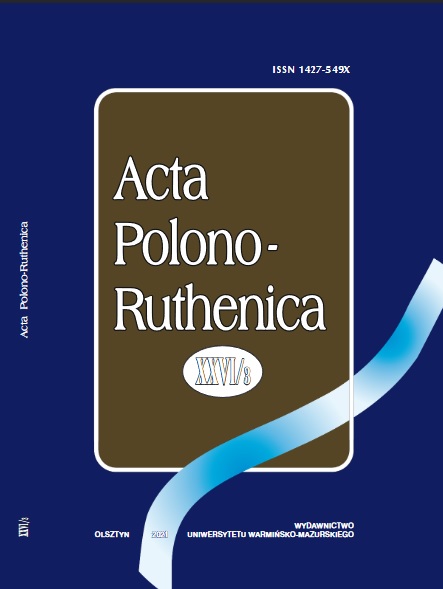Витоки i розбудова теорiï психоакцентуацiï в схiднослов’янському мовознавствi: фрагментарний огляд (кінець ХХ – початок ХХІ ст.)
The Origins and Development of the Psychoaccentuation Theory in the East Slavic Linguistics (Late 20th – Early 21st Century)
Author(s): Vitaliia PapishSubject(s): Language studies, Language and Literature Studies, Theoretical Linguistics, Philology
Published by: Wydawnictwo Uniwersytetu Warmińsko-Mazurskiego w Olsztynie
Keywords: accentuation; language personality; linguistics of the text;psycholinguistics;
Summary/Abstract: This article tracks briefly the history of the development of psychoac - centuation theory, which was transferred from the subject of study in medicine to the linguistic field. It outlines aspects of studies of this problem in the modern East Slavic psycholinguistics (namely, linquo-stylistic, linguo-conceptual, communicative, pedagogical, and methodological). An application of the methodology of psychoaccentuation makes it possible to identify the principal traits of personality without any evidence of norm breach, mental disorders encoded in the communication, artistic language, personality discourse and genres of speech. The article discusses psychiatrist K. Leongard’s pioneer research on the clinical traits of accentuated personalities and the nature of accentuated personalities in the fiction text. His ideas were further developed by doctor A. Lychko, who laid the groundwork for the study of accentuation in the field of linguistics. Although the theory was sufficiently grounded and substantiated Leongard’s ideas were not embraced by East Slavic linguistics immediately: the Soviet era limited the functional capabilities of psycholinguistics as a science. Late 20th and early 21st century marked an increase in psycholinguistic research, but it was focused mainly on artistic texts (discourse) as well as communicative and pedagogical activities, while Leongard’s ideas drew the attentionof linguists. The present study offers a classification of texts based on the theory of accentuation developed by V. Belianin. It highlights the evolution of the main ideas of psychoaccentuation and aspectual studies of artistic texts (phrase field theory) and the relevance of this theory for the development of conceptual linguistics, communicative linguistics and methodology of teaching foreign languages as promoted in the works of Russian scholars (T. Inkina, V. Lialina, T. Prokofiev, O. Gurianichev, I. Mazyrka). In addition, the article examines the research by Ukrainian linguists, who were mostly preoccupied with the actualization of linguistic and generic aspects of psychoaccentuation (Ya.Bondarenko, V, Papish) as well as the potential of text research in the psycholinquistic field, making references to the work conducted by Byelorussian scholars (V. Maslova, O. Ulanovych). The novelty of the article is that it for the first time synthesizes scholars’ views on the implementation of the theory of accentuation, while confirming the relevance of the accentuation approach in analysing linguistic facts. Based on the generalized results, a conclusion is made about the dynamic character of the issue under discussion and the possibility of further in-depth research and implementation in the new interpretive linguistics fields.
Journal: Acta Polono-Ruthenica
- Issue Year: 3/2021
- Issue No: XXVI
- Page Range: 101-118
- Page Count: 18
- Language: Ukrainian

